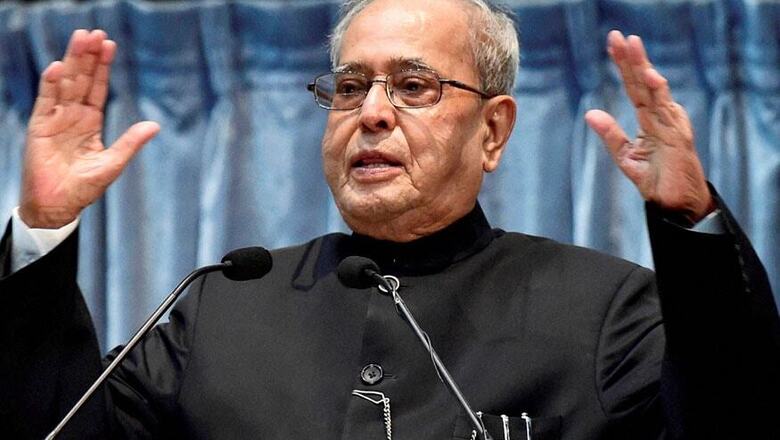
views
New Delhi: President Pranab Mukherjee on Saturday advocated the need for strong electoral reforms to strengthen the democratic process, saying it is time to look at legal provisions for increasing the number of parliamentary seats.
Mukherjee also said in the existing Indian parliamentary system, though political parties with less numbers of seats enjoy equal rights and authority with the party in power, they have "no responsibility".
He said it is necessary to undertake a "dispassionate analysis of the way in which our electoral process is functioning with a view to address the shortcomings in the system".
The President was speaking at a seminar on 'Economic Reforms With Reference To Electoral Issues' where Chief Justice of India J S Khehar said electoral promises routinely remain unfulfilled and manifestos turn out to be mere pieces of paper, for which parties have to be held accountable.
"Chief Justice of India very emphatically and relevantly pointed out accountability, but the system of parliamentary governance is such that if somebody gets 51 (majority) out of 100, 51 has all the rights and authority and in our electoral process, less than 51 have all the rights and authorities but no responsibility," Mukherjee said.
Elaborating the need for electoral reforms, the President said freeze on the population figure was imposed in 1976 which has been extended till 2026 by an Act in 2001 due to which Parliament today represents the figure of 1971 census whereas same has increased manifold.
"The Constitution (Forty Second Amendment) Act 1976 imposed a freeze on the population figure for readjustment at the 1971 census and has been extended by the Constitution (Eighty-fourth Amendment) Act 2001 till 2026.
"As a result the House of the People today represents the population figure of 1971 census whereas our population has increased manifold in the recent decades," he said.
The president said, "this gives rise to an anomalous situation wherein today, India has over 800 million voters and 543 Lok Sabha constituencies represent 1.28 billion people".
"To give true expression to the will of the people, it is time that we look at the legal provisions on the delimitation of the Parliamentary constituencies with a view to increase their number.
"If Great Britain can have more than 600 Parliamentary constituencies, why can't India, with a much higher population, have more number of seats?" the President said.
Stressing the need for reforms, he said, "a strong electoral system and timely reforms are necessary to strengthen the democratic structure of India. Timely reforms are necessary which not only would give justice to people but also to the ideals enshrined in the Constitution of India".
Referring to instability in governance, the President said, in the past, coalition governments at the Centre contributed to unstable governments necessitating frequent elections.
"Between 1989-1999, as per constitutional practice there should have been three elections in 1989, 1994 and 1999 but actually what happened was that five general elections took place in 1989, 1991, 1996, 1998 and 1999.
"To avoid that, fragile opportunistic coalitions were formed but they did not last and some of the issues to my mind can never be addressed through the real system. Some of these issues have to be addressed by the law," he said.


















Comments
0 comment